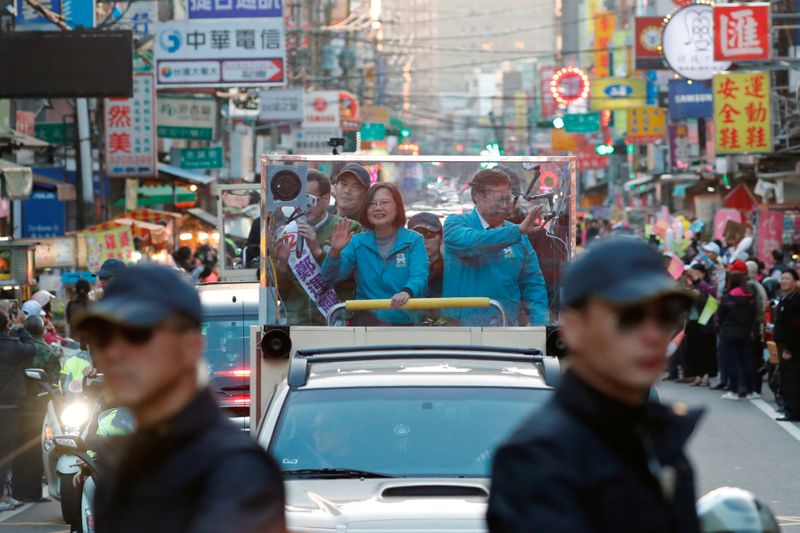By Yimou Lee and Ben Blanchard
TAIPEI (Reuters) - Beijing should not see Taiwan's elections as representing a win or loss for China, Taiwan's foreign minister said on Thursday, days ahead of a vote overshadowed by Chinese efforts to get the island to accept its rule.
Taiwan holds presidential and parliamentary elections on Saturday. Its elections are always closely watched by China, which claims the island as its territory.
Taiwan says it is an independent country called the Republic of China, its formal name, and the government has warned of Beijing's efforts to sway the vote in favor of the opposition.
"I just don't think China should read Taiwan's election as its own victory or defeat," Foreign Minister Joseph Wu told reporters in Taipei.
"If China reads too much into our election ... there might be a likely scenario that China will engage in military intimidation or diplomatic isolation or using economic measures as punishment against Taiwan."
President Tsai Ing-wen, who is seeking re-election, has repeatedly warned Taiwan's people to be wary of Chinese attempts to sway the election through disinformation or military intimidation, an accusation China denies.
Wu drew attention to China's sailing of its new aircraft carrier into the sensitive Taiwan Strait late last year, calling the voyage "clear" evidence of Beijing's attempts to intimidate voters.
"This is our own election. This is not China's election. It is Taiwanese people who go to the voting booth to make a judgment on which candidate or political party is better for them," Wu said.
"If China wants to play with democracies in other countries so much, maybe they can try with their own elections at some point."
The issue of China has taken center stage in the campaign, especially after its president, Xi Jinping, warned last year it could attack Taiwan, though said he'd prefer a peaceful "one country, two systems" formula to rule the island.
Taiwan-China ties have soured since Tsai took office in 2016, with China cutting off formal dialogue, flying bomber patrols around Taiwan, and whittling away at its diplomatic allies.
China suspects Tsai of pushing for the island's formal independence, a red line for Beijing. Tsai says she will maintain the status quo but will defend Taiwan's democracy and way of life.
'EVERY BALLOT HAS POWER'
In a front-page election advertisement in the mass circulation Liberty Times on Thursday, Tsai appealed directly for people to cast their vote against China.
"In the face of China, every ballot has power," the advertisement read, next to a picture of Tsai wearing a camouflaged military helmet and flak jacket.
Tsai's main opponent is Han Kuo-yu of the Kuomintang party, which ruled China until 1949, when it was forced to flee to Taiwan after loosing a civil war with the Communists.
Han says he would reset ties with Beijing to boost Taiwan's economy, but not compromise on the island's security or democratic way of life.
In a Facebook (NASDAQ:FB) post later on Thursday, Tsai wrote that China would be happiest if the Kuomintang got back into power.
"The elections should make Taiwan's people happy, not the Chinese government," she added.
But Kuomintang Chairman Wu Den-yih said Tsai was the real threat, pointing to an anti-infiltration law she championed and passed late last year to tackle Chinese influence. The Kuomintang says the law seeks to effectively outlaw all contacts with China.
"Don't let Tsai Ing-wen destroy the Republic of China's democracy, liberty and rule of law; just take down Tsai Ing-wen," the party cited Wu Den-yih as saying, referring to Taiwan by its official name.

Overshadowing the elections have been allegations in Australian media from a self-professed Chinese spy about China's efforts to influence Taiwan's politics and support Han, who, along with Beijing, has denounced the accusations as lies.